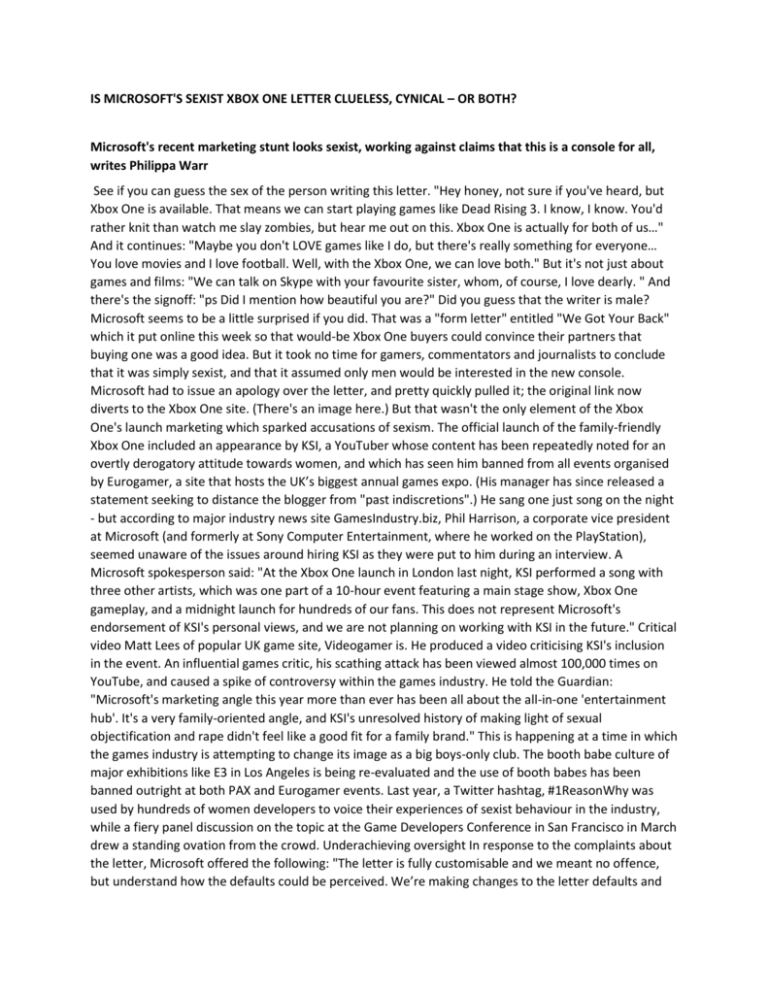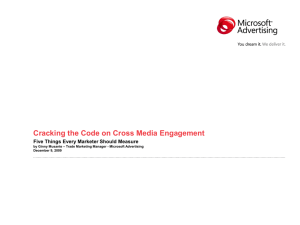Is Microsoft`s sexist Xbox One letter clueless, cynical – or both?
advertisement

IS MICROSOFT'S SEXIST XBOX ONE LETTER CLUELESS, CYNICAL – OR BOTH? Microsoft's recent marketing stunt looks sexist, working against claims that this is a console for all, writes Philippa Warr See if you can guess the sex of the person writing this letter. "Hey honey, not sure if you've heard, but Xbox One is available. That means we can start playing games like Dead Rising 3. I know, I know. You'd rather knit than watch me slay zombies, but hear me out on this. Xbox One is actually for both of us…" And it continues: "Maybe you don't LOVE games like I do, but there's really something for everyone… You love movies and I love football. Well, with the Xbox One, we can love both." But it's not just about games and films: "We can talk on Skype with your favourite sister, whom, of course, I love dearly. " And there's the signoff: "ps Did I mention how beautiful you are?" Did you guess that the writer is male? Microsoft seems to be a little surprised if you did. That was a "form letter" entitled "We Got Your Back" which it put online this week so that would-be Xbox One buyers could convince their partners that buying one was a good idea. But it took no time for gamers, commentators and journalists to conclude that it was simply sexist, and that it assumed only men would be interested in the new console. Microsoft had to issue an apology over the letter, and pretty quickly pulled it; the original link now diverts to the Xbox One site. (There's an image here.) But that wasn't the only element of the Xbox One's launch marketing which sparked accusations of sexism. The official launch of the family-friendly Xbox One included an appearance by KSI, a YouTuber whose content has been repeatedly noted for an overtly derogatory attitude towards women, and which has seen him banned from all events organised by Eurogamer, a site that hosts the UK’s biggest annual games expo. (His manager has since released a statement seeking to distance the blogger from "past indiscretions".) He sang one just song on the night - but according to major industry news site GamesIndustry.biz, Phil Harrison, a corporate vice president at Microsoft (and formerly at Sony Computer Entertainment, where he worked on the PlayStation), seemed unaware of the issues around hiring KSI as they were put to him during an interview. A Microsoft spokesperson said: "At the Xbox One launch in London last night, KSI performed a song with three other artists, which was one part of a 10-hour event featuring a main stage show, Xbox One gameplay, and a midnight launch for hundreds of our fans. This does not represent Microsoft's endorsement of KSI's personal views, and we are not planning on working with KSI in the future." Critical video Matt Lees of popular UK game site, Videogamer is. He produced a video criticising KSI's inclusion in the event. An influential games critic, his scathing attack has been viewed almost 100,000 times on YouTube, and caused a spike of controversy within the games industry. He told the Guardian: "Microsoft's marketing angle this year more than ever has been all about the all-in-one 'entertainment hub'. It's a very family-oriented angle, and KSI's unresolved history of making light of sexual objectification and rape didn't feel like a good fit for a family brand." This is happening at a time in which the games industry is attempting to change its image as a big boys-only club. The booth babe culture of major exhibitions like E3 in Los Angeles is being re-evaluated and the use of booth babes has been banned outright at both PAX and Eurogamer events. Last year, a Twitter hashtag, #1ReasonWhy was used by hundreds of women developers to voice their experiences of sexist behaviour in the industry, while a fiery panel discussion on the topic at the Game Developers Conference in San Francisco in March drew a standing ovation from the crowd. Underachieving oversight In response to the complaints about the letter, Microsoft offered the following: "The letter is fully customisable and we meant no offence, but understand how the defaults could be perceived. We’re making changes to the letter defaults and apologise for the oversight." The claim from its end being that the default options accidentally created an impression of sexism; the implication being that a computer process was at fault rather than, say, a marketing team or a group of creatives at an agency. Looking at the fiasco there are two scenarios which present themselves. For the first, take Microsoft at its word. The default settings accidentally created a narrative which feeds into a perception of women and games that the industry is (or at least should be) trying to leave behind. This presents the company as rather clueless. It would seem no one with an understanding of the wider issues and conversations taking place in and around gaming looked at the letter. No one tested out different permutations of the defaults to check that nothing iffy was going to end up being pilloried on Twitter. It suggests someone just looked at the page and ticked the big box saying "this is definitely a template letter". The second possibility is that Microsoft intentionally pulled a marketing stunt that doesn't even attempt to satirise a tired cliche – one that could potentially be brushed off as an oversight if it backfired. That scenario is cynical and depressing, and it would mean that a company keen to market the Xbox One to as wide an audience as possible was willing to belittle or patronise half that audience in the process. Neither looks great - clueless v cynical - and isn't helped by the PR faux pas of KSI's appearance. With that in mind, what likely happened is this. Marketing pushes are judged on terms like "social reach". That's measured by how many people are likely to have seen tweets about a product or an event so the marketing team or agency tends to pick people with a big social footprint - lots of Twitter followers or Facebook page likes or, in KSI's case, YouTube subscribers. In the quest for reach, it's plausible that no-one thought to check whether KSI was actually a good fit for the image Xbox One is trying to convey. What these two events suggest is a worrying lack of awareness on the part of Microsoft. It's a company vying for dominance in your living room. It wants to be the centrepiece of your leisure time, the focus of your digital entertainment desires. But you need a degree of trust and goodwill to be invited into that space. By linking the console to poisonous attitudes, these screwups run the risk of making Microsoft a presence you don't want in your home. As much as anything, it has revived the #1ReasonWhy hashtag on Twitter - and unfavourably, they're pointed at the Xbox. • Charlie Brooker on why video game television is so hard to make











